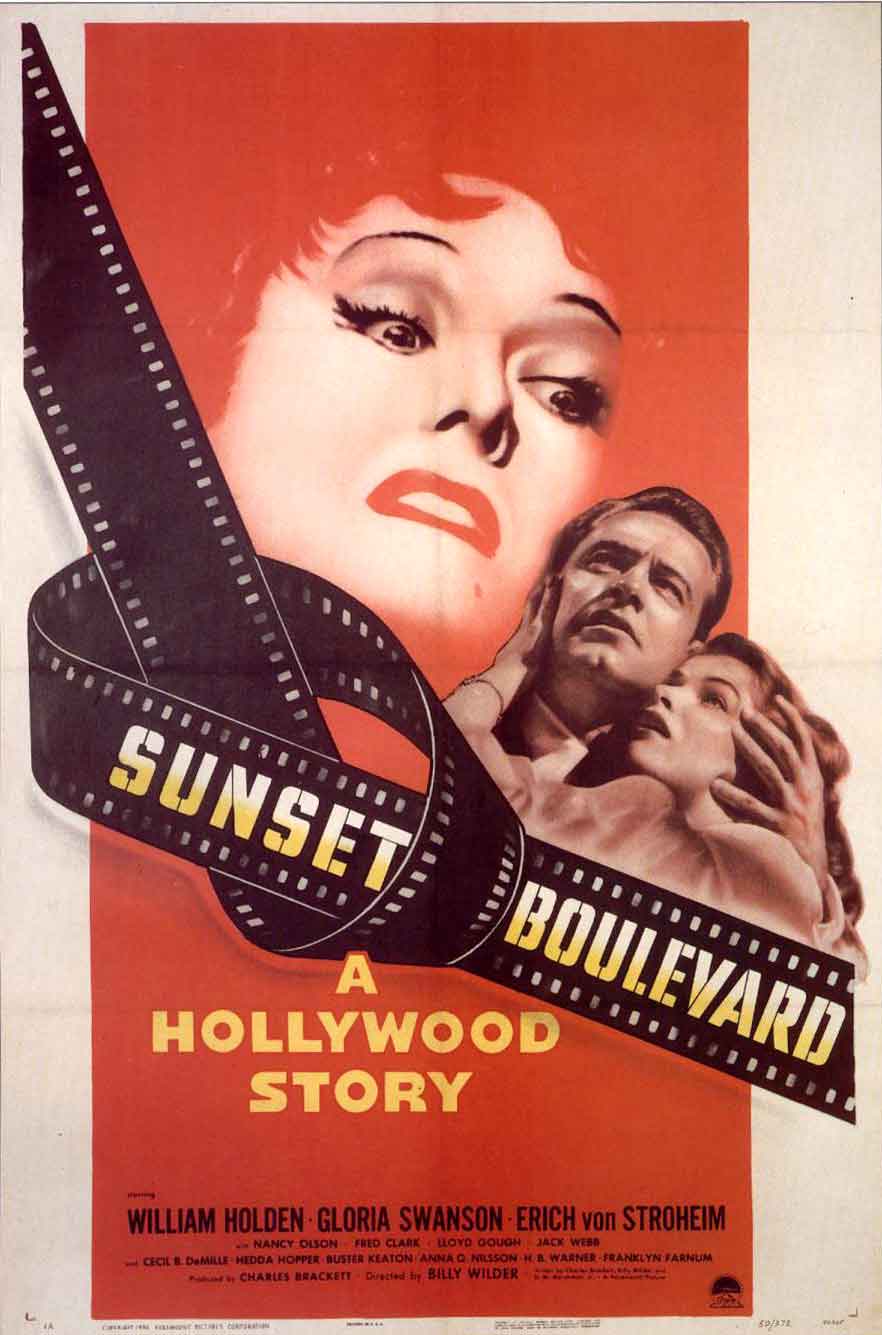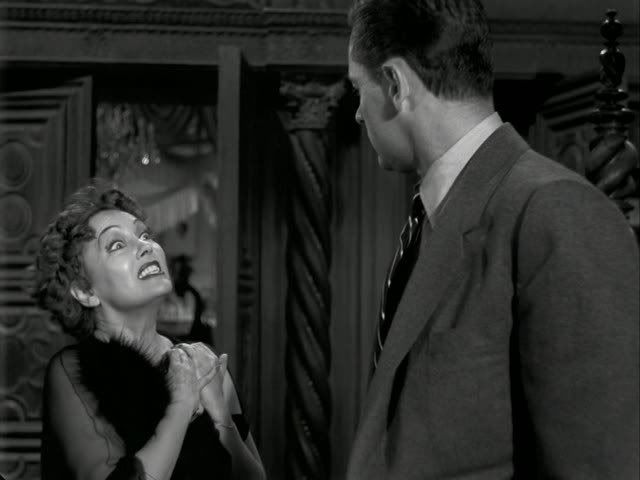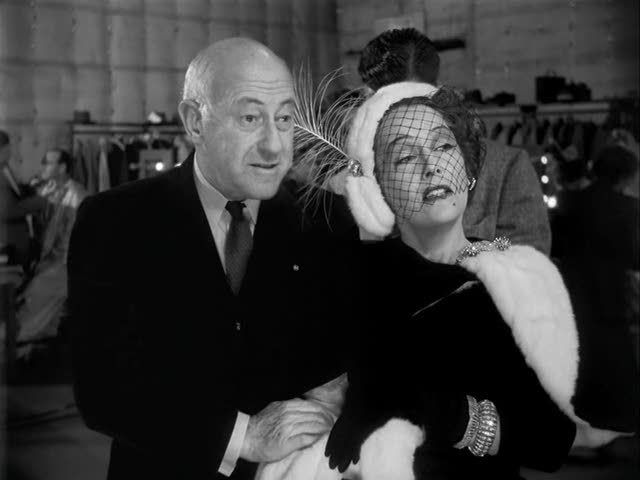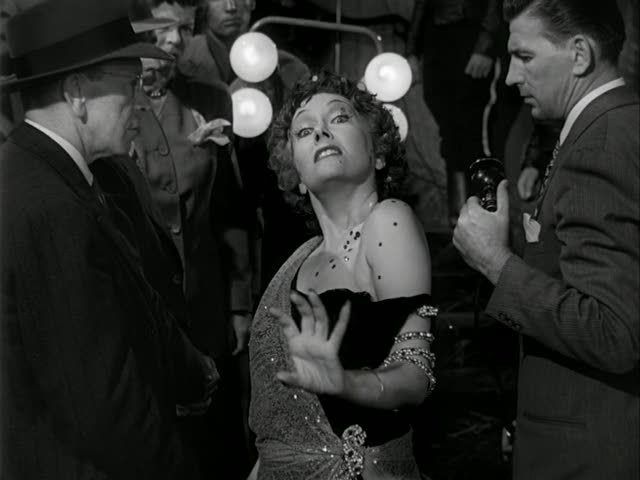SUNSET BOULEVARD (1950) - 4 STARS
"A HOLLYWOOD STORY: Sensational...Daring...Unforgettable...Sunset Blvd"
The tragedy of celebrity is presented in such grim reality in Billy Wilder's gritty focus on Hollywood deception and fall of grace; SUNSET BOULEVARD (1950). Until 1950, American films were strictly entertainment, some deeper than others. Studio executives were very protective of image and star-making. In some ways, everything seemed perfect. Billy Wilder, Charles Brackett, and D.M. Marshman, Jr. created a stunning work of art that splits the Hollywood sign in two and exposed a dream factory for what it really is: a struggle to both gain and keep composure in the limelight. The comedy is sly, the drama is of epic proportions because it's not JUST a story about Hollywood or an aging actress. It's really about the giving up of dreams.
In the movie's beginning we are shown a scene of a man lying dead in a pool outside a mansion with police and reporters circling around his body. The narrator explains to us about how this man got into the predicament which becomes the focus of the story. B Movie writer Joe Gillis (William Holden) is struggling to make a living in Los Angeles and has tried (and failed) to make money through the many scripts he has forwarded to movie executives. The fact is, he needs it not just for his wealth but to clear debts as he owes money and a car to a couple of collectors who plan to take that away from him. After being pursued by the debt collectors, Joe bursts a Tyre driving down Sunset Boulevard, a well know street, famed for its celebrity status though looks more like a ghost town, and he is forced to leave the car in a garage outside a grotty looking mansion. However he is soon confronted by stern worded butler Max (Eric von Stroheim) who escorts Joe to the owner of the house which leads to a mix-up. This owner turns out to be reclusive former silent film actress Norma Desmond (Gloria Swanson), a middle-aged has-been who still believes that she is a star despite her age and her lack of involvement in films in the last twenty years. She wants to make a 'return' to the movies and seeks Joe's help in adapting her stories in order to be welcomed back to Paramount Studios where back in her heyday she was one of the biggest stars in America, but clearly her refusal to accept her aging or the politics of Hollywood that worship youth have affected her badly. She had previously worked with acclaimed director Cecil B. DeMille who Norma still believes is willing to give her a role in his films unaware that the parade is long gone. Joe's paranoia about Norma is proven by her getting Max to move his stuff from his apartment into her mansion and clearly she is trying to gain control of Joe in a mysterious way by taking pressure off him with making him feel at home.
As Joe continues to try and adapt Norma's stories, it is clear that his writing isn't the only thing she's after from him as he soon finds out when she arranges a private party with just him and her dancing to a band playing. His refusal to get romantic with her gets a horrified reaction from her and he soon leaves her returning to his normal life. He attends a New Year's Eve party hosted by his friend Artie (Jack Webb) and his fiancee Betty Schaefer (Nancy Olson), who earlier in the film ridiculed Joe's story idea in front of a producer. Betty attempts to make amends with Joe unaware of what he's been up to and clearly there is sexual chemistry between the pair as they talk up the idea of adapting one of Joe's stories but a phone call from Max forces Joe to return to the mansion where it emerges Norma has attempted to kill herself. He reluctantly agrees to help her get better and the pair embrace leading to an unlikely relationship and as the film progresses, her happiness is brought back by feeling loved again, leading to changes around the mansion while she also gains the confidence to return to Paramount Studios to see De Mille on the film set. Unfortunately it is clear that Norma will not be back on screen anytime soon despite the attention she receives, though Joe decides to get his writing career back on track by adapting his story with Betty while Artie is away. It is Norma who starts to become paranoid about Joe leaving the house at night, as he secretly plots his story with Betty at Paramount Studios, though the pair soon grow closer leading to a kiss which leads to her declaring her love for him. However after discovering a secret from Max about his relationship with Norma, Joe finds himself facing a showdown with her about his affair with Betty in which her jealousy and insanity get to her with her madness leading to a tragic end.
Ultimately, it's the genius of Billy Wilder that keeps things in balance. It features a witty, clever and extremely well-written script and a terrible main four cast members who all received Oscar nominations for their roles. Holden's performance is well looked at as you see the pity, anger and helplessness on his face when he realizes how much Norma is using him and that he's trapped. The beautiful Nancy Olsen gives a strong performance in a rather small part while Erich von Stroheim is chilling and disturbing as Max whose secret towards the film's ending shows us why he too has come to such a state.The main acclaim though goes to Swanson who as Norma is the symbol of lost fame and has become the talk of legend. What is ironic about her character is that she may be playing herself in an odd way. She herself was an actual silent star whose career went down the drain after the talkies came about. Adding to the film's propaganda is the perception of one key theme; Love. You only have to look at what these people have done for love of another person or love of fame. Max loves Norma. Norma loves Gillis. Gillis loves Norma and Betty. Betty loves Gillis and Artie. Artie loves Betty. And all of them love Hollywood which lends an immoral 'moral tale', which sometimes leaves a bad taste. The great musical score of Franz Waxman enhances the film while John Seitz's black and white photography brings us back to that time. Scenes are shot right on the lot of Paramount Studios (even the front gate), and Norma's mansion is an unforgettable piece of history and gloom helped by the shattering conclusion which produces one of THE infamous last lines in film.
But for some younger audiences this is really one of those films that has aged. Meaning, some people will appreciate it, but others will find it hard to sit through. Painfully slow at times and just plain old aged it really takes a good understanding that this is an older film to appreciate. Sunset Boulevard lost out to ALL ABOUT EVE (1950), the Hollywood masterpiece about the Broadway stage, at the Oscars that year. The major corporation wasn't ready to award itself because some people didn't care for the way that the film was portraying itself (showing the dark, seamy side). The stick that DeMille got from his supporting role is also a little unfair on him as he was moving on through the ages yet Norma wanted to remain silent with her roles but some people are a little too accusing of one of the most important director's of the 1950s. However that doesn't stop the film from achieving its aim of lambasting the system. It can still be a realistic depiction because of its reflection of Hollywood. It can give you the idea of the dream land's transformation into a nightmare.







0 Comments:
Post a Comment
Subscribe to Post Comments [Atom]
<< Home